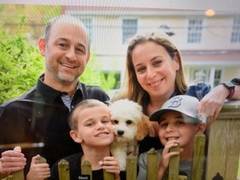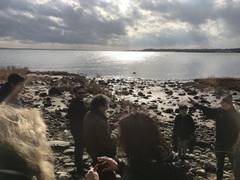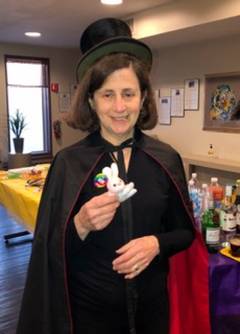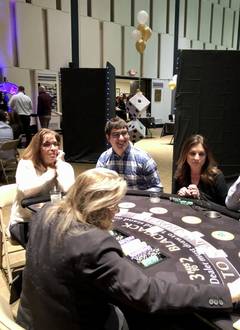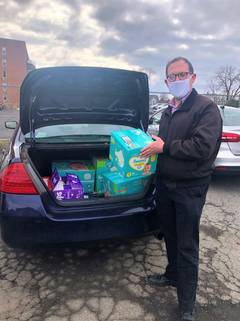Kol Nidre 2024: Divine Glory to Flesh and blood
10/15/2024 04:43:15 PM
Rabbi Ben Goldberg
| Author | |
| Date Added | |
| Automatically create summary | |
| Summary |
Do you remember the scene in Fiddler on the Roof, when Motel gets the new sewing machine? “Rabbi,” he asks. “Is there a blessing for a sewing machine?” “There’s a blessing for everything,” the rabbi replies. In the film, the rabbi then prays in Hebrew: May it be God’s will that the Divine Presence rest in the work of your hands. Not a bad blessing for a sewing machine, actually.
We do have blessings for so many things in Judaism, so much that we are meant to say 100 of them every day. Although, we do not quite have a blessing for everything. Generally we do not say a blessing for mitzvot that take place among people, such as giving tzedakah, lest we exploit someone else’s need into an opportunity to praise God.
There’s another category of blessings, though, for extraordinary experiences that bring a particular praise of the Divine to our lips. For example, there are blessings for hearing thunder, seeing the ocean, or encountering wonders of nature. There’s another blessing in this category for what, in our day, is a rare experience, but for our ancestors may not have been: seeing a non-Jewish monarch. For that, tradition invites us to say: baruch shenatan mikvodo l’basar va’dam. Blessed be the One who gave of the Divine Glory to flesh and blood.
The idea here is that, in sovereign monarchs, we encounter the ability to reward and punish, to raise up and to bring down. The authority to do this ultimately derives from God and is a human exercise of Divine power. It follows, as the medieval Rabbi Judah Low of Prague explained, that an unworthy person who claims a position of authority has violated the commandment not to take God’s name in vain. In human authority, even non-Jewish human authority, we encounter something that points us to the power, the mystery, and the awe-inspiring nature of God.
Opportunities to say this blessing today are rare, and Jewish legal authorities doubt whether it should be said in the presence of today’s remaining monarchs, given how limited their power has become. Famously, the Israeli writer Shai Agnon recited this blessing upon accepting his Nobel Prize in Literature from the King of Sweden. Though I am a great fan of the British Royal Family, I do not anticipate the opportunity to say this blessing in its original context any time soon. But I wonder if this blessing matches, at least in sentiment, something that I have experienced.
I remember voting in the 2020 election in November of that dreadful, lonely year. I went to vote early in Harrison, and finally reached the ballot box after a bit of a wait. I then looked at the ballot, at those names that had dominated the national conversation for the year leading up to that moment. Here they were, these larger than life personalities, battling it out to become one of the most important, powerful people in the world. And then, here I was, little old me, entrusted with the awesome responsibility to help decide who that person should be, just because I happened to be born in this amazing country.
This, for me, was a moment like seeing the ocean or hearing thunder. It pulled me out of my ordinary way of existing to encounter the great mystery that is human existence on this beautiful, terrible planet. It was a moment where I felt a sense of connection and responsibility for my neighbors, my community, my country, and indeed the world, all of whom would be impacted by the outcome of that voting process.
Reflecting on a similar experience, my colleague Rabbi Ben Greenfield wrote: “When we see a true Royal… our Tradition demands that we…tune in to the Spiritual Truth buried in the experience — that this too is but a glimmer of the Divine…Except, when voting, there isn’t a king or queen upon [whom] to say the blessing. As voters, *we are the ones* holding all that Unrestrained, Majestic, Overwhelming, Beautifully Connecting, Awe-Inspiring and Fear Inducing Power. So we would make the [blessing] upon ourselves.”
In other words, when we enter that voting booth, we– you and I– are the flesh and blood to whom God has given of the Divine Glory. We are the ones who hold life and death in our hands. We are the ones whose choices ripple out to impact others in ways we cannot always predict or know.
This realization is given voice in the version of the prayer for the country that we say here at KTI. For centuries, Jewish communities recited a prayer for the well-being monarchs under whom they lived. This was in accordance with the guidance of the prophet Jeremiah, speaking to the exiled Jews in Babylonia: “And seek the welfare of the city to which I have exiled you and pray to the LORD in its behalf; for in its prosperity you shall prosper.” This prayer assumed, for good reason, a posture of Jewish vulnerability. It assumed a reality where the whims of a monarch could have major implications for Jewish safety, and pleaded with God to favorably dispose those monarchs to their Jews. It’s like that other blessing from Fiddler on the Roof: “May God bless and keep the Czar…far away from us!”
But when Jews came to the United States and to other democratic nations, where the people are ultimately sovereign, the nature of these prayers changed. We no longer existed by virtue of special privileges that could be revoked at any time, but by right. So we still pray for our leaders, but for them to receive the Divine support and wisdom they need to do their jobs well. They are the ones in need, not us. And we also appeal for God to “safeguard the ideals and free institutions that are the pride and glory of our country.” What matters isn’t any one leader, but the systems within which they operate. These systems, institutions, and norms are what enables us to flourish, not the circumstantial tolerance of a king.
Al khet shekhatanu l’fanecha b’latzon. Among the many sins we begin to confess tonight is latzon. This word appears in the Al khet litany and also in the shorter confession: latznu. Latzon is scorn or scoffing. As Rabbi Jonathan Sacks explains, scorn is when “we acted or spoke disdainfully about genuine moral, ethical, or spiritual concerns. We made fun of people’s altruistic commitments.” We engage in latzon when we cynically mock serious matters and allow our negativity to undermine our or other people’s ideals.
Al khet: I have certainly been guilty of this. I’ve made light of things I should have taken more seriously. Perhaps this is a defense mechanism, protecting myself from shame or fear or other emotions I’d rather not experience. Scorn can also create emotional distance from something we find threatening; we mock something so as not to actually deal with the challenge it presents to us. And sometimes, scorn can be a cover for something sinister: a nihilistic view of the world where the only thing that matters is promoting the self and the ego.
This Yom Kippur, as we confess the sin of scorn, I’m worried that the norms and institutions of our democracy have come under a dangerous amount of scorn. I don’t mean to sound like a goody two-shoes high school civics teacher. But for much of our lifetimes, we’ve taken for granted the democratic infrastructure that creates the context for every other problem we’ve sought to address. This democratic infrastructure has been good for the world, our country, and not incidentally, for the Jewish people. Our democracy has failed at times and remains imperfect, but it beats the alternatives any day of the week.
And yet, observers have noted what one called, “a pervasive decline in democratic culture across American society manifesting in, among other things, the rise of toxic polarization and declining public support for democracy.” The causes of this are familiar: the failure of our institutions, at times, to meet people’s real needs; the internet-era seismic shifts in how people receive and share information and ideas; the centering of political identity as ethnic and religious identities have waned in importance, among other causes.
All of this has made our democracy the subject of mistrust, scorn, and nihilistic attempts to exploit its structures to seize power in undemocratic ways and to undemocratic ends. A low point in recent months were the attempted assassinations of a presidential candidate. The fact that this kind of political violence nearly changed history is simply unacceptable, and is a warning sign that something is going terribly wrong.
My friends, this cannot continue. Too much is at stake. As I described on Rosh Hashanah, there is a certain consensus of ideas that for two or three generations now has enabled the Jewish people to thrive both in the US and in Israel. And, I am sorry to say that there are significant elements within both major parties that are undermining that consensus in ways that should concern us all.
We cannot control the big picture of what will happen to our democracy in the coming months and years. But we can control our behavior. So here is my suggestion on this sacred night. We must resist the temptation to treat our democracy with scorn and contempt. We instead have to treat it with the seriousness it deserves.
What does this mean in practice? It begins back in that voting booth, in that moment when we encounter the Divine Glory that has been granted to mere flesh and blood. I learned recently that many undecided voters aren’t undecided between candidates, but undecided whether they will vote at all. I can understand the feeling that voting doesn’t matter, and the doubt of any politican’s ability to make a difference. Our two-party system often leaves people feeling like they have to choose between the lesser of two evils.
But voting is a habit; it is an expression of who we are as Americans and, as I’ve described, as Jews. There have been times when I have cast a blank ballot when I felt like I could not in good conscience support any of the candidates. But I still showed up to vote, as a value in and of itself. As a reminder, early voting in Westchester begins two weeks from tomorrow, and your last opportunity to vote is Election Day, November 5.
A second commitment follows from that first: that everyone who is legally eligible be able to vote, and that every legally cast vote be counted. This should not be controversial! Yet we’ve seen in recent years attempts to unduly disenfranchise our citizens, intimidate voters and election officials, and subject election administration to partisan political control. The attack on the Capitol on January 6, 2021 was a prominent low moment of such efforts to disrupt the peaceful transfer of power.
One impact of all of this is the resignation of thousands of longtime elections officials and poll workers, leaving many places with a critical lack of experienced staff as we approach next month’s election. By the way, if you can make yourself available for a long day on November 5, Westchester County still needs poll workers for this election. This is a tremendous mitzvah and service to the community, to enable your neighbors to vote.
Finally, treating our democracy with seriousness rather than scorn means active involvement in this precious democracy that belongs to all of us. The political scientist Eitan Hersh has developed the concept of “political hobbyism.” Hersh describes how many people who think they are politically engaged actually treat politics as an entertaining spectator sport. Political hobbyists follow the ups and downs of politics on social media and cable news, and endlessly discuss with friends, family, and strangers on the internet, much as they would follow baseball or hockey. Political hobbyism is another form of scorn for the actual stakes here, especially on the part of people who are fortunate enough that no matter what happens politically, they–we–will basically be fine. Al khet–I’ve definitely been guilty of this, too.
By contrast, real political engagement, the kind that actually creates change, involves, for instance, organizing one’s friends and neighbors, engaging with elected officials, or volunteering on issue and electoral campaigns. What if all the time and energy that goes into politics-as-entertainment went instead into these kinds of engagement? The results would be transformative for our society, and for us as individuals, too.
Finally, there is an important upcoming election that I wanted to bring to your attention, and it’s not the one on November 5. This spring, we as Diaspora Jews have our twice-a-decade opportunity to vote for the World Zionist Congress. This is the only democratically representative body of the global Jewish people, and it directly impacts the budgetary priorities and other policies of important global Jewish institutions like the Jewish Agency and JNF-KKL, to the tune of about $15 billion over five years. There is a lot at stake in this election. You can look forward to hearing from me later this year about why I’m inviting you to join me in voting for MERCAZ, the Conservative movement’s Zionist political party.
But for now, let me just suggest that the real significance of these elections is that they are an opportunity for us to take a few minutes and a few dollars to put our hands in the air and say: yes – this transformative, wonderful, messy project of Israel, Zionism, and global Jewish peoplehood belongs to me, too. Yes, I’m a part of this. Yes, I have been given a voice and a vote in what goes on in Israel, because Israel belongs not only to its citizens, but also to the Jewish people all around the world. This is not the same as Israeli citizenship, of course, but it does confer upon us rights and responsibilities as Diaspora Jews. These elections are an important moment to stand up and be counted, and to demonstrate that democracy and democratic values always have and must always remain an essential part of the Zionist project.
Closer to home, we will have another opportunity next month to express our connection with Israel. Together with several other local synagogues, on November 10 to 16, we will host 16 first responders and their families from Kibbutz Gevim. These brave individuals are part of preparedness or civil defense squads and were the first responders to the attacks of October 7, defending their community for hours until the police and military arrived. The goal of this trip is to honor these individuals and their bravery, learn their stories, and give them a respite and enjoyable trip to the New York area. We already have enough local families who have volunteered to host these guests in their homes, but there are lots of other ways to get involved and contribute with both time and money. Please contact me, Hanna Poplausky, or Vicki Lurie for more information and to get involved.
In 1790, President George Washington wrote to the Jewish community of Newport, Rhode Island, assuring them that under the new constitution, they were not merely tolerated, but had equal rights as any other citizen. “For happily,” he wrote, “the Government of the United States, which gives to bigotry no sanction, to persecution no assistance, requires only that they who live under its protection should demean themselves as good citizens, in giving it on all occasions their effectual support.” Still today, it is incumbent upon us to demean ourselves as good citizens, participating actively in our democracy and ensuring that others will also be able to do so. And, like Motel’s sewing machine, may it be God’s will that the Divine Presence rest in the work of our hands. Amen.
Tue, October 21 2025
29 Tishrei 5786
Photo Gallery
Photo Albums
Upcoming Events
-
Wednesday ,
OctOctober 22 , 2025Rabbi, May I? Modern Responsa
Wednesday, Oct 22nd 10:00a to 11:30a
Wednesdays, 10 - 11:30 AM, KTI Library Ever since Abraham’s famous argument with God, Judaism has been full of debate. Moses and Korah, David and Nathan, Hillel and Shammai, the Vilna Gaon and the Ba’al Shem Tov, Spinoza and the Amsterdam Rabbis . . . the list goes on. No wonder that Judaism cherishes the expression machloket l’shem shamayim, “an argument for the sake of heaven.” Beyond their historical importance, what makes these disputations so compelling is that nearly all of them, regardless of their epochs, are still being argued. The parade of characters spanning three millennia of biblical, rabbinic, and modern disputation reflects the panorama of Jewish history with its monumental political, ethical, and spiritual challenges. This series will examine Jewish responses to exile from the biblical period to our modern day. Considering texts from all genres of Jewish literary creativity, we will explore how the realities and iterpretaions Join as we re-open these timeless debates that lead us to the core of 3,000 years of Jewish conversation. • Justice: Abraham vs. God (October 19) • Holiness and Authority: Moses vs. Korah (November 9) • Inclusion: The Five Daughters vs. the Twelve Tribes (November 30) • Accountability and Morality: David vs. Nathan (December 21) • Resistance: Ben Zakkai vs. the Zealots (January 18) • Law: Hillel vs. Shammai (February 15) • Spirituality: The Vilna Gaon vs. the Baal Shem Tov (March 15) • Boundaries: Spinoza vs. the Amsterdam Rabbis (April 19) • Religious Evolution: Geiger vs. Hirsch vs. Frankel (May 10) • Zionism: Herzl vs. Wise (May 31) -
Wednesday ,
OctOctober 22 , 2025Wrestling with God
Wednesday, Oct 22nd 8:00p to 9:30p
Wrestling with God Wednesdays, 8-9:30 PM Congregants’ homes TBA We need to talk about God. And about how we talk, and don’t talk, about God. It’s a big topic, maybe the biggest. This offering invites adult learners into compassionate inquiry, deepening their relationship to Jewish text through collective exploration. Using the album s*ngs ab-ut g?d [https://open.spotify.com/album/6JEY2AN6awAxNfWwmXX460] by Jewish educator Eliana Light as a starting point, this series blends music, Hebrew text study, and open-ended questions to help participants examine their own connections to the divine. This is sacred work. It’s not about getting it right. It’s about showing up with curiosity, humility, and a willingness to join the long lineage of Jews who wrestle with God. Each session stands alone, but we’d love to have a consistent group as much as possible. Dates: September 10: skyman October 22: shadows November 19: in the silence December 10: if only January 21: lead me back February 11: three steps March 11: beyONEd April 29: the mountains May 20: the name June 17: I rise -
Thursday ,
OctOctober 30 , 2025Coffee with the Rabbi
Thursday, Oct 30th 8:00a to 9:00a
Start your morning with some caffeine and casual or meaningful conversation! Join Rabbi Goldberg for a Coffee Chat! Stop by Rye Ridge Starbucks any of the following Thursdays, between 8-9am: June 12 and 26 July 10 and 24 August 7 and 21 September 4 and 18 October 16 and 30 November 6 and 20 December 4 and 18 -
Saturday ,
NovNovember 1 , 2025Dror Israel Shabbat
Shabbat, Nov 1st 11:30a
Dror Israel Shabbat Dror Israel’s Mirit Sulema, along with two leaders of the Arab Youth Movement NOAL, Tal Tunik and Shadi Habiballa, will speak during a Kiddush lunch about their important work with Arab Israeli youth and bringing Jewish, Arab, and Druze youth together. Saturday, November 1st, approx. 11:30am KTI Social Hall "We eat together, laugh together. We talk about what we think of each other, and what will help bring peace.” RSVP Appreciated -
Saturday ,
NovNovember 1 , 2025KTI Gala - A November to Remember Digital Journal
Motzei Shabbat, Nov 1st 7:00p to 10:00p
Privacy Settings | Privacy Policy | Member Terms
©2025 All rights reserved. Find out more about ShulCloud

